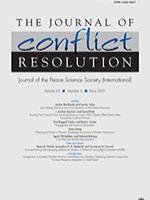Armed conflicts with al-Qaeda and the Islamic State: The role of repression and state capacity
Although their organizational cores have suffered repeated military setbacks in recent years, al-Qaeda and IS continue to expand globally to new battlefields. They do so via establishing links with local armed groups, more recently especially in sub-Sahara Africa. In a new quantitative study, which has recently been published in the Journal of Conflict Resolution, Dino Krause examines why these transnational organizations are successful in expanding to some countries, but fail in doing so, despite repeated attempts, in other contexts.
Concretely, the study examines how two factors influence the likelihood of local conflicts to become ‘transnationalized’, via a pledge of allegiance of a local armed group to al-Qaeda or IS. The first of these factors is state capacity, with a theoretical and analytical distinction being made between a) government effectiveness in providing basic social services to the population, and b) states’ military capacity to wage war. Second, the study looks at what role excessive and indiscriminate state repression plays in influencing the willingness of local rebel leaders to reach out to al-Qaeda or IS.
Based on a sample of all African, Middle Eastern, and Asian states and for the timeframe of 2003 to 2020, the study obtains various findings that bear relevance for both researchers and policy makers. First, government effectiveness is found to significantly reduce the risk of a ‘transnationalization’, that is, al-Qaeda or IS entering a local conflict. This is explained through the lower prevalence of social grievances in contexts where states manage to provide public services, which al-Qaeda and IS have often successfully mobilized upon in other contexts. While the statistical analysis does not provide any conclusive evidence with regards to military state capacity, it does so with regards to state repression. Concretely, states that systematically violate basic human rights, arbitrarily arrest civilians, or torture prisoners, have a significantly higher risk of seeing al-Qaeda or IS tapping into local conflicts on their territory. Theoretically, Krause argues that in such contexts, civilians may be more easily recruited, even though they may not share the jihadist ideology, because they seek protection from, or vengeance against the experienced injustices committed by agents of the state. At the same time, the analysis also provides evidence of reverse causality: once al-Qaeda and IS become involved in a conflict, they not only significantly reduce the ability of states to provide effective governance, but also tend to make governments behave more repressively. As regards repression, there is thus a risk of a vicious cycle in which governments try to combat transnational jihadists through resorting to repression, which then further backfires and paves the way for jihadism to take even further roots in a country.
DIIS Experts


